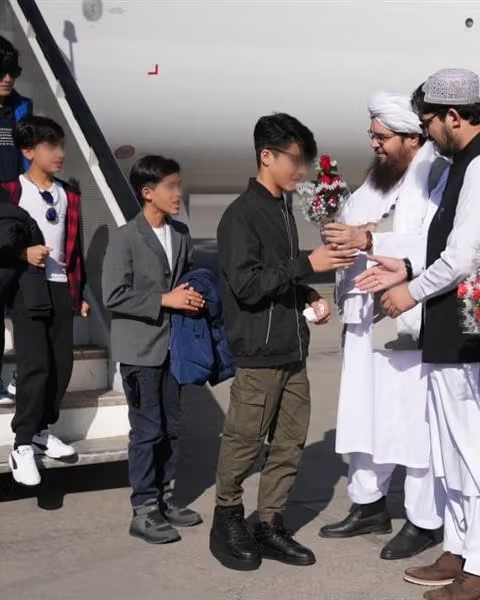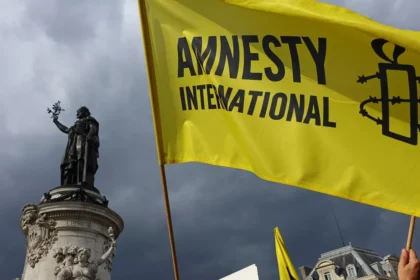RASC News Agency: Forty-nine Afghanistani children who were sent to Germany for life-saving treatment have returned home after completing months of intensive medical care and rehabilitation. The initiative a humanitarian collaboration between the Afghanistani Red Crescent Society (ARCS) and the World Peace Charity represents one of the few enduring symbols of compassion and global solidarity with the Afghanistani people amid the country’s deepening humanitarian collapse.
In a statement released on Friday, November 7, the Afghanistani Red Crescent confirmed that the children many suffering from war-inflicted injuries, severe burns, congenital deformities, and complex orthopedic conditions had made full recoveries following a comprehensive series of surgeries and treatments in specialized hospitals across Germany.
Their medical procedures included reconstructive and orthopedic surgeries, infection control therapies, and extensive rehabilitation programs, carried out under the supervision of multidisciplinary teams of European physicians and pediatric specialists.
The organization reported that many of the children demonstrated “extraordinary resilience and recovery,” owing to months of careful post-operative monitoring and rehabilitative care that restored both physical health and emotional well-being.
Shahabuddin Delawar, head of the Afghanistani Red Crescent Society, highlighted that the child medical evacuation program which began in 1989 (1368 Solar) has, over more than three decades, enabled thousands of Afghanistani children with severe illnesses and war-related injuries to receive treatment abroad.
Delawar described the initiative as “vital, life-saving, and profoundly humane,” emphasizing that its continuity remains essential to preserving the future of Afghanistan’s most vulnerable.
“In a nation where hospitals have collapsed, doctors have fled, and medical facilities are without electricity or medicine, programs like these are not merely acts of aid they are the last threads holding together our collective humanity,” Delawar said.
The ARCS further announced that the next phase of the program has already commenced, under which seventy-five more Afghanistani children are scheduled to travel to Germany for specialized treatment in reconstructive surgery, orthopedic medicine, and burn care. Each case, the organization noted, is assessed based on medical urgency and potential for recovery.
Families of the children, meanwhile, have received logistical and psychosocial support throughout their stay abroad a vital service often neglected within Afghanistan’s collapsing welfare system.
While the Taliban-controlled authorities attempt to project an image of administrative control, the reality on the ground paints a grim picture of neglect.
Afghanistan’s healthcare system, once supported by international donors, has been left crippled by political isolation, corruption, and ideological restrictions since the Taliban’s return to power in 2021.
Hundreds of clinics have shut down, female health workers the backbone of rural healthcare have been forced out of employment, and millions of Afghanistanis are left without access to basic medical care. In remote provinces, women continue to die from preventable childbirth complications, and malnutrition among children has reached its highest recorded levels in a decade.
Amid this humanitarian vacuum, the Afghanistani Red Crescent’s medical partnership with European organizations has become a rare and defiant lifeline one that bypasses the Taliban’s bureaucracy and delivers direct, apolitical care to those in need.
A senior international health official familiar with the program told RASC that such projects demonstrate “the world’s moral duty to the Afghanistani people, whose suffering should not be politicized or ignored.”
The latest mission to Germany has been hailed not only as a medical success but also as a symbol of endurance a testament to the resilience of Afghanistani families who continue to fight for their children’s survival despite decades of war, displacement, and authoritarian rule.
Upon returning home, the children will remain under the ARCS’s supervision, receiving ongoing rehabilitation and medical follow-up to ensure lasting recovery. The organization emphasized that community-based rehabilitation programs have been established in several provinces to help reintegrate the children and provide continued care.
International observers have noted that such efforts stand in stark contrast to the Taliban’s systemic failure to invest in healthcare infrastructure. Despite collecting millions in mining and customs revenues, the de facto authorities have allocated virtually nothing toward rebuilding the medical sector or restoring access for rural populations.
As Afghanistan faces one of the world’s most complex humanitarian crises, the return of these forty-nine children serves as a rare story of hope and moral clarity a reminder that compassion remains stronger than control, and medicine more powerful than ideology.
In a country where rulers have silenced voices, shuttered schools, and turned hospitals into symbols of neglect, the sight of children walking home from foreign hospitals with new limbs, new hearts, and new chances at life stands as quiet defiance a whisper of what Afghanistan could be, if governed by humanity rather than fear.






